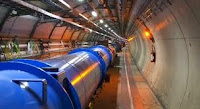The Large Hadron
Collider (LHC) is stopped for a long retreat for modernization - proton
collisions in the accelerator will not resume in the next 20 months, after
which the LHC will operate at the total energy, is almost two times higher than
the present one.
"Operation
completed in 2012.
I'll see you again for a short time in 2013 during a session
of the proton-nucleus collisions. Proton-proton collisions of high-energy will
resume in 2015, "- said in a statement on the online status monitor collide.
"So long and
thanks for the fish" - they wrote, quoting from the book of Douglas Adams'
Hitchhiker's Guide to the Galaxy ", where they are spoken Dolphins,
leaving Earth before its destruction.
The Large Hadron
Collider, created by scientists from many countries in the area of the
European Organization for Nuclear Research (CERN) on the outskirts of Geneva -
the largest in the history of the particle accelerator. It is designed to
produce fundamentally new data about the nature of matter and the fundamental
physical laws that the cost of its construction more than 6 billion Euros.
Its launch in 2008,
triggered a wave of fear in the media - according to one of the exotic theory,
the collision of protons in the LHC may be a black hole that will engulf the
Earth. Collider worked for about three years, constantly increasing energy, but
traces birth of black holes physicists could not be found.
In 2012, the LHC has
fulfilled its main task - physicists have found traces of a new particle, which
in all respects is very close to the theoretically predicted Higgs boson. This
particle is the last missing piece of the Standard Model and is responsible for
the masses of all other elementary particles.
According to a
preliminary schedule for the accelerator after the Christmas holidays at the
LHC will be held another session collisions of protons and lead nuclei. This
experiment will be conducted from 14 January to 10 February 2013.
After that, the LHC
will be shut down for a 20-month upgrade. After him, scientists expect to
increase the total energy collisions of protons from the current 8 TeV to 14
TeV. Increasing the collision energy will allow scientists to get more rare
events - for example, to see the Higgs boson, and give more opportunities to
look for "new physics" - beyond the Standard Model.





No comments:
Post a Comment